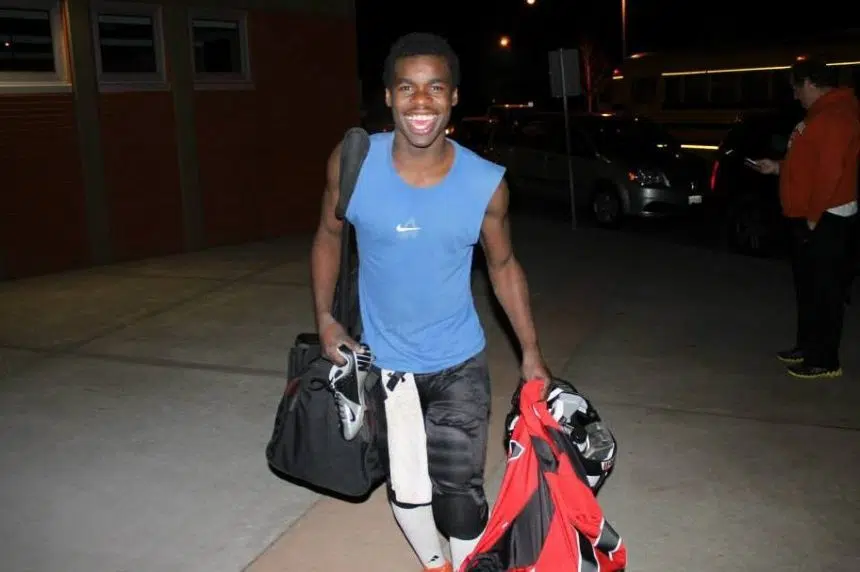“Samwel did not get the care he needed.”
Those were the words of Saskatchewan Health Authority (SHA) CEO Scott Livingstone on Thursday during a public apology to the family of Samwel Uko.
In a media release Thursday, the SHA said officials met with members of Uko’s family and “formally apologized for the events that transpired in our facilities” before the 20-year-old man’s death in Regina on May 21.
Livingstone and John Ash, the SHA’s executive director of acute care in Regina, held a media conference Thursday to publicly apologize for the SHA’s role in Uko’s death.
“Our sincerest condolences go out to everyone affected by Samwel’s passing, and most especially his parents and extended family,” Livingstone said in a release issued before the news conference.
“Samwel was a vibrant young man who sought help from us and we failed to provide him the timely assistance he needed. There are no words that can bring Samwel back, but I do want the public to know that we recognize how deeply we failed him.
“As an organization, we are committed to enhance access to mental health supports across Saskatchewan. Samwel’s tragic experience with our health system will strengthen our resolve to advance this work.”
Uko died of an apparent suicide May 21. A coroner’s inquest is to be held into his death.
According to Uko’s family, the one-time University of Saskatchewan Huskies running back went to hospital seeking help but didn’t get the assistance he needed. His body was found later that night in Wascana Lake.
“I need people to know he was a good kid. He wanted to live, I know he wanted to live, but it was too much for him. To decide to kill himself, it was too much for him and he couldn’t handle it anymore,” Uko’s uncle, Justin Nyee, told 980 CJME in late May.
“I want people to know that we need to do more.”
Uko’s uncle said the young man had difficulties getting assistance due to his mental state at the time.
“His mental capacity was not there for him to be able to fill out the paper that they gave him. It was just another thing to add on top of what he is dealing with,” Nyee said.
In Thursday’s release, the SHA said Uko sought help in the emergency department at the General Hospital “and was improperly denied care.”
A critical incident review was carried out to assess how the SHA acted with regards to Uko’s death. Documents provided to Uko’s family as part of the review were shared with The Canadian Press.
“As he was being escorted out of the facility, video footage shows him calling, ‘I need help. I need help. I have mental-health issues,’ ” the review says.
The documents say Uko was connected with a mental-health clinic intake worker in the early afternoon and referred to an appointment with a psychiatrist within a week. He was told to contact a community outreach and support team or go back to the emergency room if he felt worse.
Hours later, the review says, he was brought back in by police. He had called 911 asking to go to hospital because he had mental-health issues.
The review says Uko was seated in a hallway between the registration and triage desks.
The desk clerk tried to get Uko to confirm he had been in for an earlier visit, but he did not, the review says. There was confusion over the last name he provided.
“The process for registration of an unidentified patient was not utilized,” the report said.
The health authority says that after police left, a security officer consulted with a triage nurse and a decision was made for four officers to remove Uko. He was not registered or seen by the triage desk.
Video showed him calling for help on the way out.
“The honest truth is we spent too much time trying to obtain his identity and not enough time focusing on his care needs,” Ash said.
The authority said a number of factors played into the incident, including the fact conflicting information about Uko’s identity was collected, the process for registering an unidentified patient wasn’t followed, information wasn’t shared with key partner organizations, and the process around removing patients or visitors wasn’t done properly.
In light of Uko’s case, the SHA vowed to improve its registration and triage processes, adapt its COVID-19 screening and visitation protocols, improve its information-sharing processes with partner organizations, address the gaps in the process for removing someone from an SHA facility, improve the co-ordination of mental health supports within the ER, and strengthen the Stop the Line Protocol.
Livingstone said there haven’t been any terminations or disciplinary steps taken at this time with regards to Uko’s care on May 21.
“You have to understand health is a human business,” Livingstone said. “Human beings are fallible and make mistakes.”
He said the review did not show any deliberate actions on the part of any individual leading to the lack of care Uko received.
“There were not processes in place to ensure that Samwel or any other patient for that matter in a similar situation received the right care,” Ash said.
Livingstone said the situation “demonstrates we have a long way to go” with regards to mental health care in Saskatchewan.
The CEO said the SHA has a goal to create a framework that will lead to a more culturally responsive health-care system, though it does not plan on creating health-care plans tailored to various cultures specifically.
In another release, NDP Leader Ryan Meili called on Premier Scott Moe and Health Minister Jim Reiter to also reach out to the Uko family “to make it clear that they will take action to prevent this happening to anyone else.”
“After such a heartbreaking loss, we want our leaders to take responsibility and to take action,” Meili said in the release.
— With files from The Canadian Press











